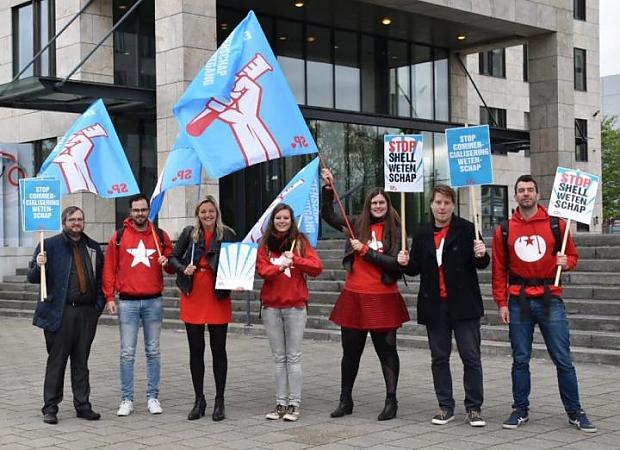Stop subsidies to the fossil industry
Stop subsidies to the fossil industry

Every minute the fossil industry receives €14,000 in state support. That’s €7.6 billion per year. Almost half of this sum results from the exemption of air transport and shipping from energy taxes. At the same time, the energy transition in the Netherlands is going far too slowly. The Netherlands has never before emitted more CO2 than it did in 2016. The share of the market held by sustainable energy is scarcely growing. We must make the polluters pay instead of giving them huge subsidies. The money freed up could be invested in energy conservation and the transition to sustainable energy, affordable for all. Education and science can and must play a crucial role in this transition.
By Sandra Beckerman and Frank Futselaar
Biased science
Close links continue to bind science and the fossil industry. This results in excesses in which science becomes biased in favour of fossil interests. Only last week a complaint was lodged regarding the integrity of a professor at Rotterdam’s Erasmus University who had failed to mention that a piece of research with which he was involved was funded by Shell. The research’s conclusions were extremely favourable to the company.
There is still a great deal more scientific research into fossil energy than into sustainable solutions. Recent years have seen the government, together with industry, investing primarily in short-term research projects. Their thinking seemed logical: corporations know what’s needed and innovation can be put quickly into practice through cooperation. In practice things turned out differently. In July the Minister for Economic Affairs concluded that “hardly any groundbreaking innovations have been achieved.” A study conducted by professor of innovation and economics Marianna Mazzucato confirms this. Major breakthroughs seldom come from the sort of short-term studies involving corporations in which the Netherlands currently invests, but from protracted, publicly-funded research.
The fossil industry also has links to junior- and middle-school education. Shell is currently organising the Generation Discover Festival, a technology event for young people which has provoked a great deal of protest. Shell’s lesson packages give an extremely rosy view of the fossil industry. Despite the fact that 100,000 people have suffered some form of damage or injury as a result of drilling for gas and the related earthquakes in Groningen, Shell’s claim to school students is that only slight tremors can be provoked.
New jobs
The Netherlands Organisation for applied scientific research (TNO) has predicted that between now and 2030 50,000 jobs will be created by the transition to renewable energy, far more than will be lost in the fossil industries. These jobs will be at all levels, with the innovative company McKinsey calculating that 45.000 jobs will come from installation alone, which would be great. These jobs will not be created, however, if the energy transition isn’t speeded up, and unless we invest now in good education, including technical education, there won’t be anyone to fill them.
The Netherlands is lagging behind in the energy transition, so far behind our neighbours in fact that we have come to be known as the dirty man of Europe. We must speed up. The close links between education and science on the one hand and the fossil industry on the other must be cut. The billions paid in subsidies to the fossil industry must be ended. Potentially, many jobs can be created, which is why we need to invest in good technical education from junior school onwards, at all levels. The vocational paths VMBO and MBO currently receive far too little attention. Moreover, strong investment in long-term fundamental and independent scientific research is needed. This is the kind of research that leads most often to breakthroughs.
In the opinion of the Socialist Party, with its lesson package Shell is giving a false, rosy picture of the fossil industry.
